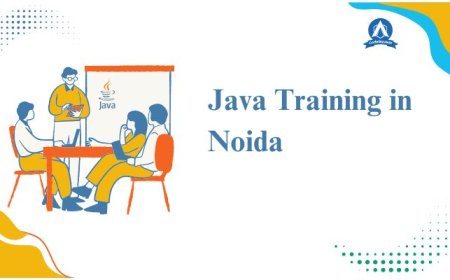Why AWS Certifications Are in Demand?
Explore why AWS certifications are in demand, proving cloud skills, boosting careers, and meeting the industry’s growing technology needs.

In todays cloud-driven world, there has never been a better time to gain AWS skills. As more businesses migrate their workloads to Amazon Web Services, certified professionals are in high demand. Whether youre a developer, system administrator, or IT enthusiast, an AWS certification courses in Chandigarh can open doors to exciting career opportunities in cloud computing. But with so many options, how do you choose the right one? Lets break it down together.
Why AWS Certifications Are in Demand?
Amazon Web Services dominates the global cloud market with a massive portfolio of services supporting organizations of all sizes. Companies want professionals who can architect, deploy, and manage these cloud-based solutions efficiently.
An AWS certification not only validates your technical skills but also makes your resume stand out in a competitive job market. From fresh graduates to experienced engineers, more people than ever are turning to AWS training to advance their careers.
Understand Your Current Skill Level
Before enrolling in any AWS certification course, take a good look at where you stand:
Are you a beginner with little to no cloud experience?
Do you have IT or networking basics?
Have you worked with cloud services before, even on a different platform?
Assessing your current knowledge will help you avoid frustration and pick a course that matches your readiness. For total beginners, its best to start with the fundamentals before moving to associate or professional-level certifications.
Choose the Right Career Path
AWS certifications are designed around various career paths, so its important to choose one that aligns with your goals:
-
Developer if you want to build, test, and deploy applications
-
Architect if you want to design highly available, scalable cloud systems
-
SysOps/DevOps if youre interested in automation, CI/CD, and infrastructure management
For example, if your long-term goal is to become a solutions architect, start with a foundational certification and then plan to progress to the AWS Solutions Architect Associate and eventually the Professional level. This structured path ensures you build solid, layered skills.
Industry Trends and Opportunities
It also helps to consider current market trends before picking your AWS certification course.
Cloud security, serverless architecture, and container orchestration (e.g., Kubernetes with EKS) are all growing areas with significant opportunities. If youre excited about these technologies, keep them in mind when planning which certifications to pursue later.
For example, while the AWS Certified Cloud Practitioner is a great entry point, those interested in DevOps should soon follow up with the AWS Certified DevOps Engineer Professional.
Entry-Level Certifications: Where to Start
AWS Certified Cloud Practitioner
For complete beginners, the AWS Certified Cloud Practitioner is an excellent first step.
What it covers:
-
Basic AWS architecture
-
Cloud concepts
-
Billing and pricing
-
Security fundamentals
Why its valuable:
It gives you a solid foundation and confidence before tackling more technical associate-level exams.
Prerequisites: None, though some IT familiarity helps.
AWS Associate-Level Certifications
Once you grasp the basics, consider associate-level certifications like:
AWS Certified Solutions Architect Associate
Ideal if you want to design secure, cost-optimized systems on AWS.
AWS Certified Developer Associate
Perfect for those who want to write and deploy cloud-based applications.
AWS Certified SysOps Administrator Associate
Best if youre focused on operations, deployment, and management of AWS systems.
These associate-level certifications go deeper technically, so be sure you have some hands-on lab practice before attempting them.
Evaluate Course Content
Not all courses are created equal. Look for an AWS certification course with these features:
-
Up-to-date curriculum (AWS services evolve quickly!)
-
Coverage of all exam objectives
-
Scenario-based projects and case studies
-
Exam preparation quizzes and sample questions
A high-quality course will go beyond theory, teaching you how to apply skills in real-world environments.
Check for Hands-On Labs
Learning AWS is all about doing. Choose a program with interactive labs, sandboxes, or guided projects so you can:
Launch EC2 instances
Set up VPCs
Work with S3 buckets
Configure IAM roles and permissions
Practical exercises help solidify your knowledge and boost your confidence on exam day. Many top providers like A Cloud Guru, Pluralsight, and AWS Skill Builder offer these practical resources.
Review Instructor Credentials
Before you commit, check who is teaching the course:
-
Do they have real-world AWS experience?
-
Are they certified themselves?
-
Do they actively update their materials as AWS evolves?
Strong instructors bring not just book knowledge, but also hands-on experience, making the learning process clearer and more enjoyable.
Study Resources and Support
A well-designed AWS certification course should also include:
Discussion forums or community access
Study guides
Practice exams
Cheat sheets and diagrams
These resources help you clarify doubts and reinforce your knowledge as you move through the material.
Take Advantage of Free Trials and Samples
Still unsure? Many online platforms offer free trial periods or preview lessons. Take advantage of these to check if the teaching style and content match your needs.
Final WordsChoosing your first AWS certification course might feel overwhelming, but by understanding your current skills, career path, and industry trends, youll find the perfect place to begin. Whether you start with the Cloud Practitioner or jump straight into an associate-level course, the key is to combine theory with hands-on practice.
AWS skills are a powerful career booster in todays tech landscape, and getting certified can put you on a rewarding path in cloud computing.
Ready to launch your AWS career? Explore AWS training today and take the first step toward becoming a cloud expert!
FAQs
Q1: Can I take an AWS certification with no IT background?
Yes, the AWS Certified Cloud Practitioner is designed for beginners and does not require prior technical experience.
Q2: How long does it take to prepare for the Cloud Practitioner exam?
Most learners take about 46 weeks with consistent study and practice labs.
Q3: Which associate-level AWS certification is best?
The Solutions Architect Associate is the most popular, but choose based on your career interests (developer, DevOps, etc.).
Q4: Do AWS certifications expire?
Yes, certifications are valid for three years, after which you need to recertify.

































-1744728435835.webp)




